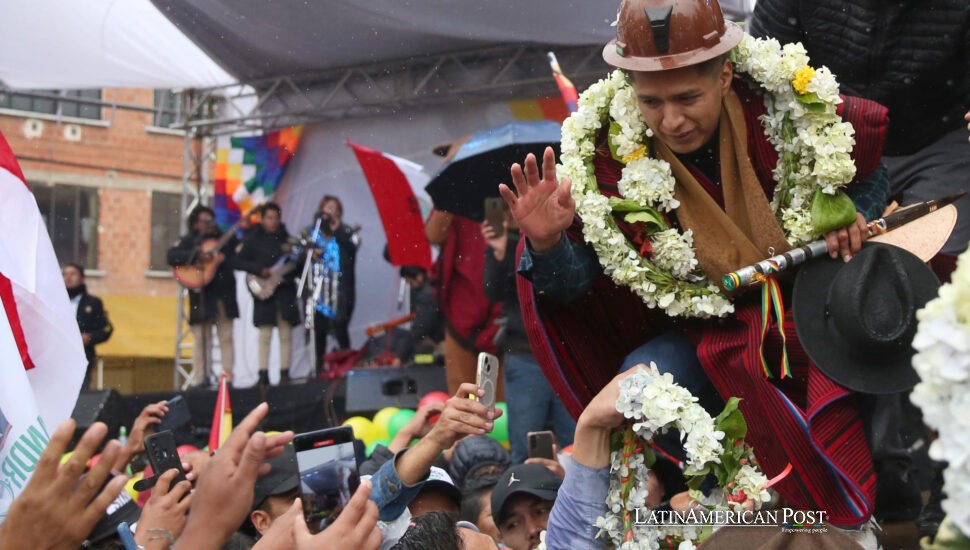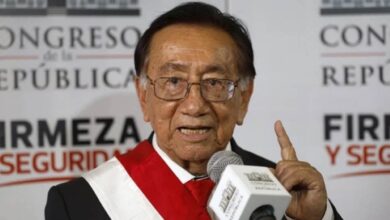Bolivian Leader Emerges from the Heart of the Cocalero Movement with Presidential Dream

With deep roots in Bolivia’s cocalero movement and a political trajectory linked to former President Evo Morales, Senate President Andrónico Rodríguez surprised the nation by announcing his run for the August general elections, forging his bold, independent path.
Beyond Evo Morales
Born in 1988 in Sacaba, a town nestled in the heart of Bolivia’s Trópico de Cochabamba region, Andrónico Rodríguez grew up surrounded by the cocalero tradition that would later shape his political career. This region, known for its abundant coca leaf production, is also the historic power base of former President Evo Morales, who led Bolivia from 2006 to 2019. Morales’s influence in the area, through the Seis Federaciones del Trópico de Cochabamba (Six Federations of the Tropic of Cochabamba), has been pivotal in cementing the cocalero movement as a formidable force in Bolivian politics.
Rodríguez’s parents, Carlos Rodríguez and Sinforosa Ledezma, were both cocalero producers. The young Andrónico experienced union meetings firsthand because he was dedicated to the movement. He did not expect to take on a leadership role at the time. At eight years old, his family moved to Entre Ríos, crucial to the coca-leaf economy. This move showed him more of rural Bolivia’s social and economic realities.
Committed to expanding his horizons beyond local union work, Rodríguez pursued higher education in Political Science at the Universidad Mayor de San Simón (UMSS). He graduated in 2011, an achievement he describes as “a step forward” for his family. According to information provided by Bolivia’s Senate, Rodríguez later completed a master’s degree in Security, Defense, and Development at the Escuela de Altos Estudios Nacionales (School of Higher National Studies).
Despite his formal academic endeavors, Rodríguez’s true calling remained within the cocalero movement. Rising through the ranks of student and youth groups, he took on various union responsibilities until, in 2013, he assumed the position of secretary of records in the Central Primera Manco Kapac B. This role paved the way for him to become the top representative of the Federación Mamoré Bulo Bulo—one of the key federations that anchor the cocalero cause in Cochabamba.
In October 2018, Rodríguez was elected vice president of the Coordinadora de las Seis Federaciones del Trópico de Cochabamba, an organization traditionally helmed by Morales as president. Re-elected to this vice presidency in 2021 and 2023, Rodríguez became known as the “heir” to Morales’s leadership among grassroots supporters, mainly for his ability to mobilize social movements and strike deals with national authorities.
Distance from Morales and Arce
Amid Bolivia’s turbulent political shifts, Rodríguez became national prominence in 2019. He was a candidate for the Senate with the Movimiento al Socialismo (MAS), Morales’s long-standing party, in elections later annulled following the contentious crisis that saw Morales step down. Allegations of electoral fraud by the opposition and claims of a “coup d’état” from Morales’s allies triggered a national upheaval, ultimately installing Jeanine Áñez as interim president from 2019 to 2020.
Throughout the protests against Áñez’s interim government, Rodríguez stood alongside cocalero leaders demanding a return to the constitutional order. This act boosted his standing among MAS supporters. In the subsequent 2020 elections, Rodríguez’s name briefly surfaced as a potential MAS presidential candidate. However, in a surprising turn, Morales endorsed his former Minister of Economy, Luis Arce, to lead the party’s ticket, and Rodríguez once again ran for (and won) a Senate seat.
Upon MAS’s electoral victory, Rodríguez was elected president of the Senate in November 2020. He has held this position throughout the current legislative session. Twice, in 2022 and 2023, when President Arce and Vice President David Choquehuanca were abroad, Rodríguez served as Bolivia’s interim president for a few hours. These stints highlighted his status as a significant figure within the MAS structure, yet they also amplified rumors that he might eventually strike out on his own.
In an interview with EFE, Rodríguez explained, “I have always been respectful of my mentor Evo Morales, but there comes a time when you have to consider what is best for the country and the movement as a whole.”
Tensions within the party grew as factions aligned with Morales clashed with those supporting Arce over the control of MAS’s leadership and the upcoming August elections. Aware of these power struggles, Rodríguez initially resisted being pulled into confrontation. “We need unity,” he told EFE, “but unity doesn’t mean ignoring the people’s will or the demands of the cocalero bases.”
An Independent Path to the Presidency
Controversy has followed Rodríguez at various junctures of his public life. In 2020, he caused a stir when he performed a deep bow before Spain’s King Felipe VI at the La Paz airport during preparations for President Luis Arce’s inauguration ceremony. Critics from across the political spectrum described this gesture as contradictory to the “decolonization” narrative championed by Morales during his nearly 14 years in office.
A point that garnered disapproval happened when he called the Bolivian law, designed to prevent violence based on gender, “anti-men.” This comment provoked adverse reactions from feminist groups and individuals who defend human rights. They emphasized the critical requirement for more intense protection because of the rise in violent acts against women.
Rodríguez has retained a solid level of support, especially with young people living in areas where coca is farmed. These individuals see him as a link between the history of Morales and what will happen with the movement. To social justice and making the economy better is what he has promised. These are essential parts of what the coca farming movement stands for. This connects with rural communities as they search for current leaders.
After disputes arose within MAS, details regarding a bigger disagreement with Morales gained wider circulation. Rigid faction members within the party claimed Rodríguez was too agreeable to President Arce. Those who support Arce noticed his visible commitment to Morales. In a situation between disagreeing opinions, Rodríguez had a choice. He could continue loyalty to Morales or develop an individual political standing.
He chose the latter. On May 3, in a ceremony in Oruro, Rodríguez officially announced his candidacy for the August general elections. “I respect my mentor, but it’s time for a new chapter,” he told EFE, emphasizing his need to “serve the country more directly.”
As the race approaches, political observers and citizens wonder what party Rodríguez will represent. Will he develop a new platform? Will he join a more minor faction? Will he look for an alliance with MAS groups that disagree? Up to now, Rodríguez has said nothing about such details. One certainty is that he departed from Morales’s shadow to pursue his political ambitions.
Regardless of his path, Rodríguez has made history by becoming one of the youngest Senate presidents. He is a leader, and few combine academic qualifications with union work at a basic level. A campaign he leads to become president shows a significant change. This change affects MAS and all Bolivian politics. The question is whether a divided cocalero movement will rally behind a fresh face who once bowed before a Spanish king yet stood on the barricades against an interim government.
Observers note that Rodríguez’s success will likely hinge on his ability to court both the rural cocalero bases loyal to Morales and the urban middle classes that grew disenchanted with the political tumult of recent years. He walks a delicate tightrope for now: balancing respect for Morales’s influence with the desire for change that many within MAS have begun to voice more openly.
Also Read: Colombian Warriors And Forgotten Tales from the Distant Korean War
Bolivia plans for the August elections. Andrónico Rodríguez is nearing a new period. His mentor made changes that helped. The young senator’s branching out may show a turn for a country ready for new leadership. Whether he can build enough momentum to supplant or complement Morales’s legacy remains an open question—one Bolivians will have the chance to answer when they cast their votes in a few months.




